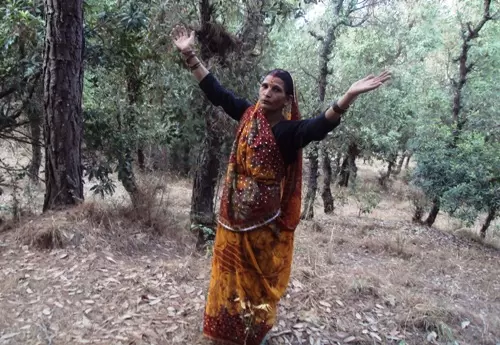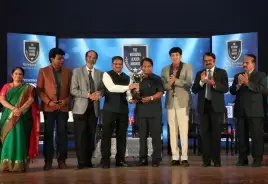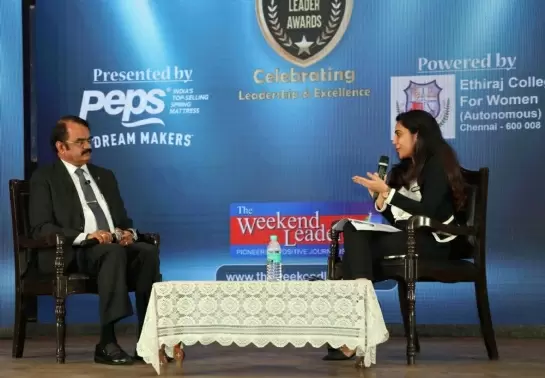It’s time farmers take all help and adapt to newer, better ways of making farming feasible
04-January-2016
Vol 7 | Issue 1
It’s a looming crisis, one that families living in the numerous villages that dot Almora district in Uttarakhand are not entirely unused to now.
Hardworking hill women, who are the backbone of local households and farms, have noticed the subtle changes in the seasons over the recent years – a factor that has made agriculture, their traditional livelihood, difficult to pursue.
 |
|
In Guna village of Lamgara block of Almora district, Sudha Gunwant, 47, has proved herself as a passionate environmentalist and successful farmer (Photo: WFS)
|
As one of them put it, “I may soon have to stop using my farmland for anything other than growing fodder grass. The erratic rains destroy whatever I sow, be it paddy or potato. I just see no point in putting in so much effort if there is going to be no return in the end.”
Clearly, for agrarian communities in this region, the road ahead is only getting rougher owing to the variable weather patterns that have not just adversely affected their cropping cycles but also led to the destruction of the forests on which they are dependent for basics like fuel, fodder and water.
However, despite the obvious difficulties, there’s one woman from Guna village in Lamgara block of Almora, who has turned her farm into a veritable hub of biodiversity.
Unassuming and ever smiling, Sudha Gunwant, 47, enjoys taking visitors around her home and land holding. After all, it is a perfectly run mixed farm – conventional grains are harvested seasonally along with a variety of vegetables, fruits and exotic flowers. Additionally, she also rears livestock for dairy and keeps bees for honey, which she sells on demand.
While Gunwant’s farm is doing well these days, it does not mean that she is oblivious to the dangers of climate change. She observes, “I remember when I had come to this village in 1980 after marriage, farming was the mainstay of most families. Unfortunately, the changing environment and weather has become a threat to our way of life. On my part, I am determined to overcome this challenge.”
Help has come to Gunwant through the Central Himalayan Environment Association (CHEA), a non government organisation that assists mountain communities to achieve sustainable development by adapting to climate change.
According to Pankaj Tewari of CHEA, “Most agriculture in Uttrakhand is rain-fed. So the seasonal variations that have impacted rainfall and snowfall are extremely worrying. It has affected soil fertility and hence the yield. Of course, locals do still make an effort to grow some lentil or rice and fodder grass, but it’s the bare minimum.
“At CHEA we have been working intensively for sustainable livelihood development in various villages around Lamgara and Sudha-ji has been an inspiration for everyone. She has successfully demonstrated how, given the right support, people can effectively adapt to climate change and transform their lives.”
By Gunwant’s own admission, although she has always been a passionate environmentalist, becoming the able farmer she is today required effort. She needed to acquire the necessary expertise. Initially, her heart had been set on becoming a teacher, a dream that she gave up after marriage.
But keen on making a mark within the community, she finally got the chance to prove herself when, about a decade ago, she was chosen to head the Guna Van Panchayat. Van Pachayats are village-level councils that are responsible for the day-to-day management of local civil forests.
Under the guidance of CHEA, she not only got the chance to fully understand what it was that was triggering climate change, but she was also introduced to the various government schemes that promote sustainable livelihood for hill folk, like cash crop cultivation, horticulture, floriculture and various non-farm activities like animal husbandry and bee-keeping.
Walking towards Gunwant’s home the first thing that one notices are the fruit trees that encircle the yard. “These were planted in 2002. I got the saplings from the state horticulture department with CHEA’s help,” says the industrious woman, pointing towards the cluster of peach trees which, she proudly informs, have already yielded a crop for each over the last few years.
Then there are lemons, oranges, cucumber, colocasia (arvi), tomatoes, radish, French beans and corn growing on the farm. The surplus produce regularly makes its way to the mandi (wholesale market) in Almora, fetching her a decent income. Besides these, flowers such as gladiolas, chrysanthemums and marigolds that grow in a small poly shed built just off the courtyard, also find a ready market, especially during the festival seasons.
Strolling past trees of kafal (local wild berry), bhimal (fodder) and low hanging kiwi fruit creepers, one arrives at a tin-roofed open shed. This is the vermi-pit that provides Gunwant with all the organic manure she needs for her crops and has also become a source of substantial revenue. Indeed, she “has taken full advantage of the government schemes and was one of first few farmers in the district to take up vermiculture by creating a pit in my own backyard”.
It was her willingness to experiment with alternate sources of income generation that led her to undertake animal husbandry and apiculture (bee keeping) – and whatever added money she makes by selling milk or honey she simply ploughs back into the land.
“I have several bee boxes. Keeping them clean, ensuring the safety of the bees from the wasps, protecting them from the cold weather, and ensuring availability of food for them in the winter – all this requires tremendous time and energy,” she says. Her hard work yields sweet rewards in the form of the honey which she collects from the apiary. Every season she gets about six to eight bottles of pure organic honey.
From dawn to dusk, Sudha Gunwant, who was conferred the state’s Green Ambassador Award in 2012 for her significant contribution towards biodiversity conservation, is a busy woman.
Says she, “The life of hill women is extremely difficult and in families where the men don’t have permanent jobs they shoulder all burden as wives, mothers and even farmers. A farmer’s life is intrinsically connected to nature – too little or too much sun, rain or snowfall is always bad for the land.”
According to this successful woman, the time has come for farmers to take all the help they can get and adapt to newer, better ways of making farming feasible. - Women's Feature Service














